
Khartoum, Sudan | AFP | Sudanese protesters voiced regret Thursday at an army decision to suspend crucial talks on installing civilian rule but vowed to press on with a sit-in despite being targeted in fresh violence.
Army generals and protest leaders had been expected to come to an agreement on Wednesday over the make-up of a new body to govern Sudan for three years.
The issue is the thorniest to have come up in ongoing talks on reinstating civilian rule after the generals took over following the ouster of longtime autocratic president Omar al-Bashir last month.
But in the early hours of Thursday, the chief of Sudan’s ruling military council, General Abdel Fattah al-Burhan, announced the talks had been suspended for 72 hours as security in Khartoum had deteriorated.
He demanded that protesters dismantle roadblocks in Khartoum, open bridges and railway lines connecting the capital and “stop provoking security forces”.
The Alliance for Freedom and Change, the group that is leading the protest movement and negotiating the transfer of power with the army rulers, called the move “regrettable”.
“It ignores the developments achieved in negotiations so far… and the fact that Wednesday’s meeting was to finalise the agreement, which would have stopped the escalations such as roadblocks.”
The protest movement vowed to press on with the “sit-in outside the army headquarters and across the country”.
– Several roadblocks removed –
Protesters said the army aimed to provoke demonstrators.
“They want to provoke the people by delaying the negotiations … but the negotiations will resume now that the roadblocks have been removed,” said Moatassim Sayid, a protester at the sit-in.
On Thursday morning, several roadblocks in downtown Khartoum had been taken down, an AFP correspondent reported, adding that troops from the paramilitary Rapid Support Force (RSF) were deployed in some areas.
Roadblocks on key thoroughfares in the capital are being used by demonstrators to pressure the generals to transfer power to a civilian administration.
The talks began on Monday and achieved significant breakthroughs, but have also been marred by violence that left five protesters and an army major dead and many wounded from gunshots.
Protesters allege that members of RSF were behind the violence.
But Burhan said there were “armed elements among demonstrators who were shooting at security forces.”
He defended the paramilitary group, saying “it had taken the side of the people” during the uprising that toppled Bashir on April 11.
The British ambassador to Khartoum said Sudanese security forces had fired at protesters on Wednesday when eight were reported wounded near the sit-in, where thousands remain camped demanding the generals step down.
“Extremely concerned by use of live ammunition by Sudanese security forces against protesters in Khartoum today, with reports of civilian casualties,” Irfan Siddiq wrote on Twitter on Wednesday.
“Military council must act to stop this now. No more excuses.”
– US blames generals –
Washington blamed the military council for the bloodshed that left six dead on Monday.
“The tragic attacks on protesters … were clearly the result of the Transitional Military Council trying to impose its will on the protesters by attempting to remove roadblocks,” the US embassy said in a statement.
The protest movement said the generals wanted the demonstrators to restrict themselves to the sit-in area.
Protesters are demanding a civilian-led transition, which the generals have steadfastly resisted since bowing to their demands and toppling Bashir.
During the first two days of talks the two sides had agreed on an overall civilian structure, including a three-year transitional period for the full transfer of power to a civilian administration.
They had also agreed that parliament be composed of 300 members for the transition, with around two-thirds from the alliance and the rest drawn from other political groups.
The make-up of the new sovereign council has been the toughest part of the negotiations, with the two sides so far proposing different compositions of the body which is expected to take all key decisions concerning national issues.
The generals want it to be military-led, while the protesters insist on a majority civilian body.
General Yasser al-Atta, one of the members of the current ruling military council, had vowed earlier this week to reach a deal by Thursday that “meets the people’s aspirations”.
The new council is expected to form a transitional civilian government, which would then prepare for the first post-Bashir election after the three-year changeover period ends.
 The Independent Uganda: You get the Truth we Pay the Price
The Independent Uganda: You get the Truth we Pay the Price



